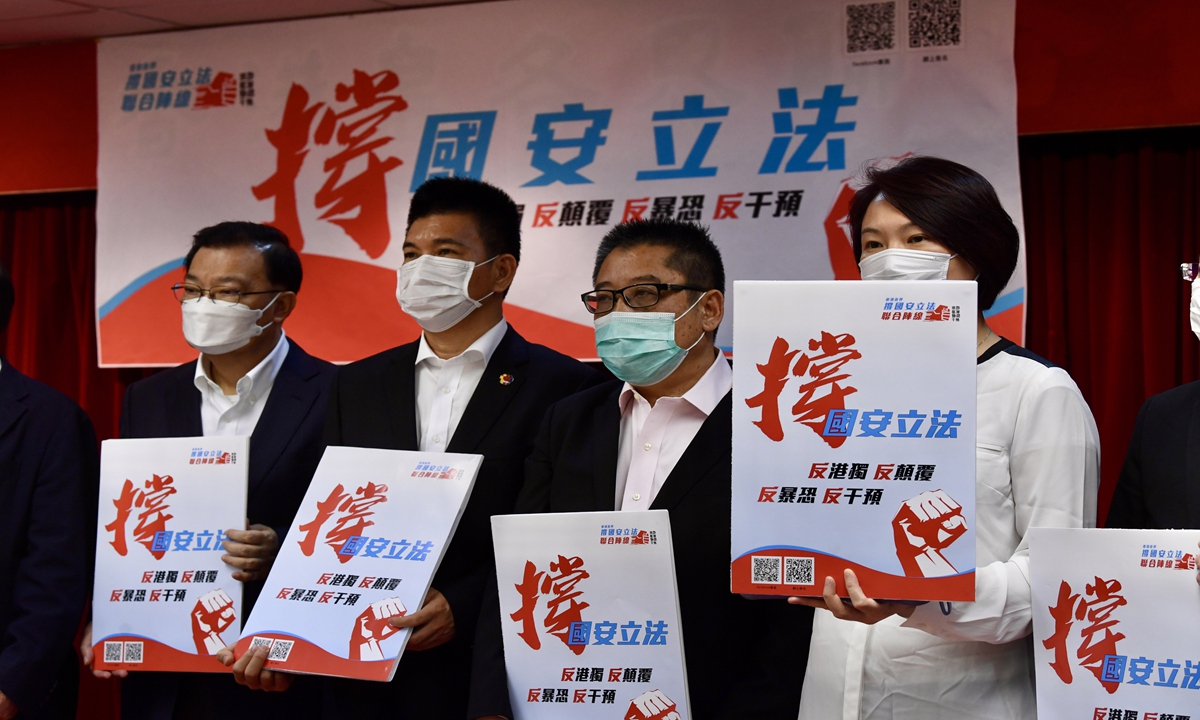HK passes national anthem bill
By Chen Qingqing and Fan Lingzhi Source:Global Times Published: 2020/6/4 21:58:41
Law to create basic conditions for HK’s ‘ecological’ changes

The United Front Supporting National Security Legislation holds a press conference on Monday, saying that 2.92 million Hong Kong citizens have signed a petition in support of the proposed national security legislation. Photo: cnsphoto
Hong Kong lawmakers passed the national anthem bill on Thursday, which was considered a victory for the pro-establishment group amid the intensifying political battle, as the bill had been delayed due to disruptions from pan-democratic legislators.Forty-one voted in favor of the bill and one against after three readings - a legitimate move that would punish insulting the anthem for up to three years in prison and a maximum penalty of HK$50,000.
The passage of the bill comes as pan-democratic legislators had used a series of malicious moves to interrupt the meeting procedures. While some Western media depicted the national anthem bill and upcoming national security law for Hong Kong as "controversial" laws that would erode the high autonomy and freedom of Hong Kong people, some lawmakers and local residents slammed such claims as "untrue."
Both bills are seen as legitimate as they have nothing to do with infringing on individual rights of Hong Kong people protected by the Basic Law, as some Western media have reported, observers said. The laws would target a small group of people who insult the national anthem or endanger national security.
The national anthem law has been implemented in the Chinese mainland since 2017, and the National People's Congress Standing Committee introduced the law through Annex III of the Basic Law. According to Article 18 of the Basic Law, national laws shall not be applied in the Hong Kong Special Administrative Region (SAR) except for those listed in Annex III to this law. And the laws listed therein shall be applied locally by way of promulgation or legislation by the region.
The Hong Kong SAR government started pushing forward the promulgation of the national anthem bill since the start of 2018, and deliberations have been delayed due to the month-long social turmoil in the city.
Following anti-government group instigations and the lack of relevant laws, some have insulted the national anthem in Hong Kong. For example, soccer fans booed the national anthem at a match in 2017.
"The NPC push for the national security law for Hong Kong and passage of the national anthem bill would create basic conditions for Hong Kong's 'ecological' changes," Chan Cheuk-hay, President and Principal of Hong Kong College of Technology, told the Global Times on Thursday.
It would take time for some young Hong Kong people to change their minds from not accepting the national anthem to obeying the law, which also requires a lot of work, he said.
"Still, the law would help some of them regain their dignity, as those who show no respect to their own country would be despised by the world," the president said.
The NPC Standing Committee also recently announced that the newnational security law for Hong Kong would be introduced into the SAR through Annex III, while some observers expect the process of formulating and enacting the law to be faster than expected.
While the national anthem bill took two years to enact in Hong Kong, the upcoming national security law is expected to be quickly implemented as the city has been engulfed by riots and violent protests, which has even become a place where hostile forces plotted anti-China activities over the past years.
"If the NPC standing committee unveils and passes detailed regulations of the national security law for Hong Kong by the end of June, it could be implemented before the mid-July LegCo recess to disqualify some lawmaker candidates who are not qualified," Wong Kwok-kin, Legislative Council member and vice president of the Hong Kong Federation of Trade Unions, told the Global Times on Thursday.
During Thursday's deliberations, opposition lawmakers Chu Hi-dick and Ray Chan were thrown out of the meeting room after they tossed a foul-smelling liquid, which some lawmakers called a "disgusting" move to disrupt the debate.
"From street protests to LegCo meetings, pan-democratic legislators won't easily give up on their agenda in opposing local or central government," Hung Kam-in, a member of the Kwun Tong District Council in Hong Kong, told the Global Times on Thursday. However, the newnational security law would surely have a deterrent impact on some forces that would make fuss in the city.
Western media like Reuters and the Associated Press said the LegCo passed the law amid growing concerns that the high degree of autonomy of Hong Kong has been threatened, as the law was enacted the day opposition groups planned mass gathering in Victoria Park, which was reportedly banned by the police.
However, sources close to the matter confirmed that the police would not ban it as long as it's a peaceful assembly.
Newspaper headline: Hong Kong passes national anthem bill
Posted in: HK/MACAO/TAIWAN